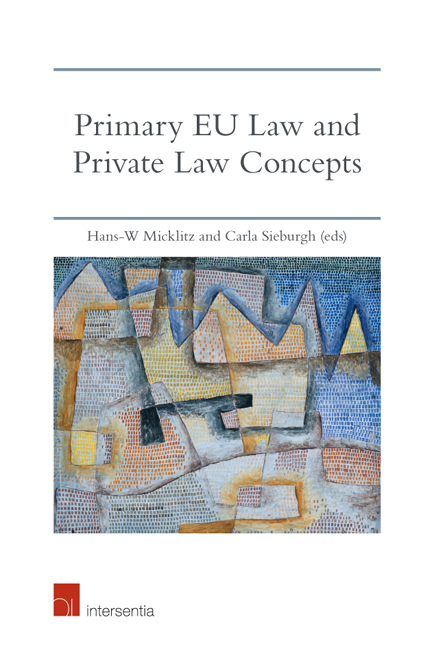Book contents
- Frontmatter
- Preface
- Summaries of the Chapters
- Contents
- Table of Cases: Alphabetical
- Table of Cases: Chronological
- List of Authors
- Chapter 1 Primary EU Law and Private Law Concepts
- Chapter 2 The Impact of Free Movement of Goods and Services on Private Law Rights and Remedies
- Chapter 3 The Impact of Free Movement of Capital on Private Law
- Chapter 4 The Impact of Competition Law on the Private Law Concepts of Nullity and Damages
- Chapter 5 The Impact of Article 101(2) TFEU Nullity on Private Law
- Chapter 6 The Impact of EU State Aid Law on National Private Law
- Chapter 7 The Impact of EU Intellectual Property Law and the Charter on Private Law Concepts
- Index
Chapter 2 - The Impact of Free Movement of Goods and Services on Private Law Rights and Remedies
Published online by Cambridge University Press: 27 September 2018
- Frontmatter
- Preface
- Summaries of the Chapters
- Contents
- Table of Cases: Alphabetical
- Table of Cases: Chronological
- List of Authors
- Chapter 1 Primary EU Law and Private Law Concepts
- Chapter 2 The Impact of Free Movement of Goods and Services on Private Law Rights and Remedies
- Chapter 3 The Impact of Free Movement of Capital on Private Law
- Chapter 4 The Impact of Competition Law on the Private Law Concepts of Nullity and Damages
- Chapter 5 The Impact of Article 101(2) TFEU Nullity on Private Law
- Chapter 6 The Impact of EU State Aid Law on National Private Law
- Chapter 7 The Impact of EU Intellectual Property Law and the Charter on Private Law Concepts
- Index
Summary
INTRODUCTION
The free movement of goods and services are central to the functioning of the internal market of the European Union (EU). The provisions of the Treaty on the Functioning of the European Union (TFEU) governing the free movement of goods (Article 28 et seq TFEU) and services (Article 56 et seq TFEU) principally address Member States, though may under certain circumstances also extend to private actors. While many scholars have devoted their attention to analysing those circumstances and the way in which they have been articulated in the case law of the European Court of Justice (‘Court of Justice’), considerably less attention has been paid to the exact consequences in private law of the application of the free movement of goods and services. Does such application to private law relationships create, modify or extinguish rights and obligations, does it affect existing private law remedies, and if so, how? Not surprisingly, EU lawyers do not regard these consequences as part of their core business, yet scholars of private law, and national courts dealing with civil matters in particular, grapple with the questions that follow from the application of the free movement of goods and services to private law disputes.
It is argued in this chapter that the impact of the free movement of goods and services on private law rights and remedies, and the underlying relationships that are governed by them, is pervasive and multi-faceted, yet not well understood in legal scholarship and practice. EU lawyers conceptualise – and do so rightly – the cases brought before the Court of Justice on free movement of goods and services, as cases of internal market law. However, if we remember that trade in goods and services typically takes place based on private law arrangements, namely contracts, we must admit that the decisions rendered by the Court will also have an impact on underlying contracts and related private law rights and obligations of individuals. Even if a contractual relationship is absent in the context, it was at least the potential of a private party to engage in a contractual relationship with a party based in another Member State that was at stake, and thus led to the decision by the Court.
- Type
- Chapter
- Information
- Primary EU Law and Private Law Concepts , pp. 47 - 92Publisher: IntersentiaPrint publication year: 2017



